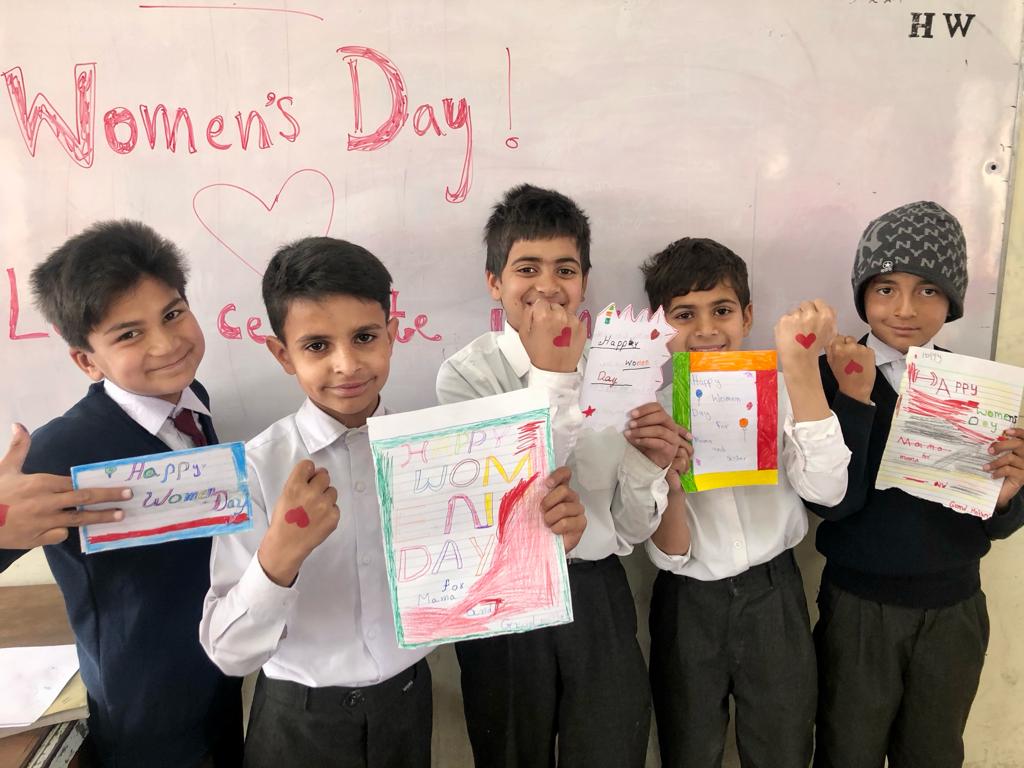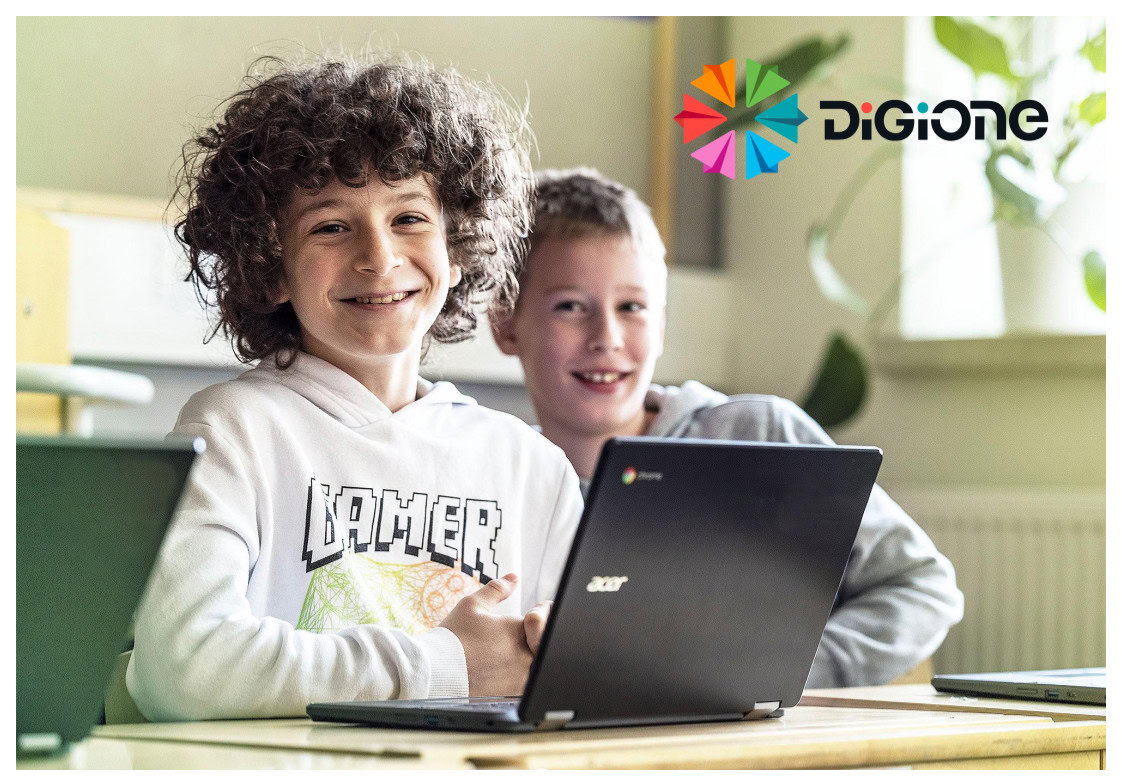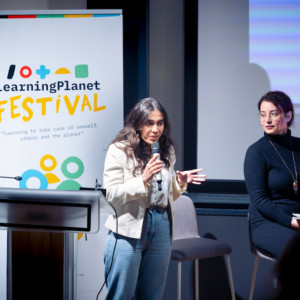World Teachers’ Day is back, as always, on 5 October! On this occasion, we aim to celebrate inspiring teachers around the world, whose work deserves to be highlighted. In this article, meet Maha from Pakistan, who is driven by a profound passion for creating sustainable education systems that provide equitable opportunities for every child to learn, grow, and thrive.
We met Maha through the Teachers for the Planet Programme, a global coalition co-led by the Aga Khan Foundation, Learning Planet Institute and Teach For All, which witnesses inspiring examples of outstanding educators all around us. It puts teachers and education leaders at the centre of the educational response to our climate crisis.
Are you an exceptional educator like Maha, working to address the climate crisis in your school? We are now collecting solutions, 100 of which will be presented to policymakers at COP28.
What are your sources of inspiration?
My journey in teaching has been profoundly influenced by my unwavering passion for education’s transformative power, having experienced it firsthand in my own life. My primary sources of inspiration have been my remarkable students, who displayed extraordinary determination to learn despite facing various obstacles. Additionally, I drew inspiration from the resilience exhibited by their families and the broader community, which deeply valued education as a path to a brighter future.
How do you involve kids on topics that are important to you?
To instil kindness and empathy among my students, I took a proactive approach. When I initially began teaching, there was a noticeable gender divide in the classroom, with limited interaction between boys and girls. To bridge this gap, I paired them up, encouraging them to learn from one another’s experiences and challenges. This initiative eventually led to the development of close friendships, and the boys in the classroom taking the lead in celebrating Women’s Day each year.
To tackle critical issues like bullying, I organised classroom plays, ensuring the active participation of all students. I also utilised movies as a tool to raise awareness about these issues.

Additionally, I established an ‘Express Yourself’ wall in my classroom, providing students with a creative outlet to express their emotions through artwork, creating a platform for them to share their feelings and thoughts.
Furthermore, I adopted a hands-on learning approach, aiming to empower my students and actively engage them in the learning process. As a science teacher, I sought to make environmental issues, particularly climate change, relevant to their lives. This involved integrating real-life examples, discussions related to their community, and encouraging them to share their thoughts and ideas, fostering a sense of ownership in addressing these critical topics.


What’s the best advice your students have given you?
My students served as my greatest inspiration, teaching me valuable life lessons along the way. They demonstrated unwavering positivity and perseverance, regardless of the formidable challenges they faced in their lives. Despite these hurdles, they arrived at school each day with beaming smiles, eager to learn and work towards a brighter future. This resilience inspired me to adopt a similar outlook in my own life.

From them, I learned the virtues of patience and empathy. Patience became a cornerstone of my teaching, understanding that some students required extra time to grasp concepts or needed additional support due to diverse backgrounds. Furthermore, their lesson in empathy deepened my understanding of their struggles and motivated me to create a more supportive learning environment. I found that students appreciated when I listened to their concerns and showed genuine interest in their well-being, reinforcing the value of building strong teacher-student relationships founded on trust and mutual understanding.


What are your main challenges as a teacher?
Teaching during the COVID-19 pandemic in a low-income community school in Pakistan presented numerous challenges. Limited access to digital resources prevented a smooth transition to virtual learning. Overcrowded classrooms and insufficient teaching materials made it difficult to provide personalized attention.
Many students faced socio-economic hardships, affecting their focus and attendance. Additionally, the curriculum’s heavy emphasis on rote-learning left little room for critical thinking and imagination. The broader school system’s failure to recognize students’ unique needs and realities and the stigmatization of those who couldn’t perform well added to the complexity of these challenges.
How does teacher shortage affect you in your daily working life?
The teacher shortage significantly impacted my daily work as I had to manage larger class sizes, making it challenging to provide individualized attention to my students. Teachers often had to juggle multiple roles, from administrative tasks to repairing infrastructure, due to the lack of support staff. Professional development opportunities were scarce, and teachers were often stretched thin, leaving little time for training or continuing education.
Do you feel valued as a teacher? Why? Why not?
I have always felt an immense sense of value and worth as a teacher, primarily because of the love and appreciation I received from my students and their families. Their support and recognition made every effort I put into teaching feel incredibly rewarding and worthwhile.

However, I must acknowledge that there have been times when I felt that the broader society did not adequately value the teaching profession. Teaching was often perceived as a last resort in terms of career choices, and this perception was reflected in low salaries and a general sense of being underappreciated. This perspective is somewhat disheartening, considering the critical role teachers play in shaping the future by educating and nurturing the next generation of leaders and citizens.
How do you think the teaching profession could be better valued?
To enhance the value of the teaching profession, several key steps should be taken. First and foremost, society must recognize the profound impact teachers have on students and the nation’s future. This recognition should be accompanied by tangible measures, including competitive salaries that attract and retain talented individuals in the teaching profession, thus acknowledging the importance of their role and providing them with the financial stability they deserve.
Secondly, continuous professional development opportunities should be provided to teachers, enabling them to refine their skills and stay current with the latest educational methods and technologies, demonstrating a commitment to their growth and improvement. Lastly, involving teachers in the decision-making processes related to educational policies is crucial, as their firsthand experience and insights are invaluable in shaping policies that effectively meet the needs of both students and educators.

How do you think the teaching profession could be better supported? From whom do you receive the most support?
The teaching profession can be better supported through a collaborative effort involving various stakeholders. Personally, I have received significant support from my family and colleagues. However, for effective support, active engagement from multiple fronts is essential. Families and communities of students can contribute by fostering a more supportive educational environment and emphasizing the value of learning.
Colleagues can contribute through collaborative efforts, sharing best practices and innovative teaching methods. Government involvement is crucial with increased investment in education, leading to improved infrastructure and working conditions for teachers. Comprehensive teacher training programs are essential for equipping educators with modern methodologies and diverse learning strategies.
Lastly, community engagement initiatives like mentorship programs strengthen support networks for both teachers and students. Together, these collaborative efforts can empower teachers and ensure high-quality education for all students, regardless of their background or location.
Meet Maha
Maha Shoaib is a Fulbright Scholar from Pakistan, currently pursuing her studies in International Education Policy at the University of Maryland College Park. As a Graduate Fellow at GCE-US, she is actively engaged in collaborative efforts aimed at promoting Sustainable Development Goal 4 (SDG4) through advocacy, public policy initiatives, strategic communications, and youth engagement.
She previously played a pivotal role in expanding access to quality education by teaching in a rural community in Islamabad and collaborating with various stakeholders. Her efforts were recognized by the Teacher Task Force at the United Nation’s Transforming Education Summit 2022.
With professional experience working with the Ministry of Finance in Pakistan and the Pakistan Institute of Development Economics (PIDE), Maha is driven by a profound passion for creating sustainable education systems that provide equitable opportunities for every child to learn, grow, and thrive.



